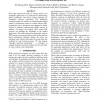Free Online Productivity Tools
i2Speak
i2Symbol
i2OCR
iTex2Img
iWeb2Print
iWeb2Shot
i2Type
iPdf2Split
iPdf2Merge
i2Bopomofo
i2Arabic
i2Style
i2Image
i2PDF
iLatex2Rtf
Sci2ools
125
click to vote
MSE
2002
IEEE
2002
IEEE
The Impact of SMT/SMP Designs on Multimedia Software Engineering - A Workload Analysis Study
This paper presents the study of running several core multimedia applications on a simultaneous multithreading (SMT) architecture and derives design principles for multimedia software engineering. The multimedia workloads range from memory to computational-bounded kernels. A performance metric to evaluate effective SMT performance gain is introduced, and compared to similar metrics on symmetric multiprocessor (SMP) systems. In addition, we analyze and compare SMT versus SMP systems, and highlight the advantages in the studied applications. The results indicate that sharing the cache in SMT processors can provide better cache locality and thus better performance although sharing the cache can introduce cache conflicts and reduce the actual cache size available for each logical processor. We also propose “mutually beneficial prefetching” -- a technique to schedule threads so that they prefetch data for each other in order to reduce cache miss penalty.
Cache | Hardware | MSE 2002 | SMT Performance Gain | Smt Versus Smp |
Related Content
| Added | 15 Jul 2010 |
| Updated | 15 Jul 2010 |
| Type | Conference |
| Year | 2002 |
| Where | MSE |
| Authors | Yen-Kuang Chen, Rainer Lienhart, Eric Debes, Matthew J. Holliman, Minerva M. Yeung |
Comments (0)

